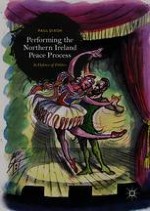2019 | OriginalPaper | Chapter
2. The ‘Real’ and Theatrical Politics of the Peace Process: Beyond Idealism and Conservative Realism
Author : Paul Dixon
Published in: Performing the Northern Ireland Peace Process
Publisher: Springer International Publishing
Activate our intelligent search to find suitable subject content or patents.
Select sections of text to find matching patents with Artificial Intelligence. powered by
Select sections of text to find additional relevant content using AI-assisted search. powered by
